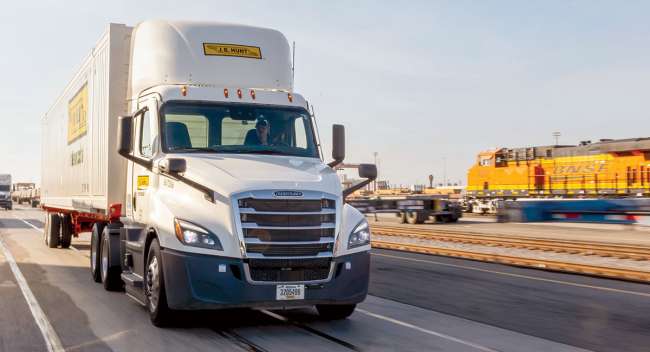J.B. Hunt Posts Lower Earnings, Revenue in Q1

[Stay on top of transportation news: Get TTNews in your inbox.]
J.B. Hunt Transport Services President Shelley Simpson noted the trucking industry has entered a freight recession while discussing first-quarter results April 17.
The Lowell, Ark.-based carrier posted net earnings of $197.8 million, or $1.89 a diluted share, for the three months ending March 31. That compared with $243.3 million, $2.29, during the same time the previous year. Total operating revenue decreased 7% to $3.23 billion from $3.49 billion.
J.B. Hunt ranks No. 4 on the Transport Topics Top 100 list of the largest for-hire carriers in North America and No. 5 on the TT Top 100 list of the largest logistics companies.
The results were below Wall Street expectations. Estimates had called for $2.05 per share and quarterly revenue of $3.45 billion, according to Zacks Consensus Estimate.

Simpson
“We’re in a challenging freight environment where there is deflationary price pressure for an industry that continues to face inflationary cost pressures,” Simpson said during a call with investors. “Simply stated, we’re in a freight recession. As we have discussed, we believe we are in a position to deliver exceptional value for our customers by leveraging our full suite of services to deliver maximum efficiency and eliminate waste.”
Simpson added the strength and resiliency of the business is supported by its mode-neutral approach. She also noted the company remains committed to disciplined long-term investments in its workforce, technology and capacity.
“While none of our businesses are immune to this environment, I am confident that there are great things happening in our business that set us up for long-term success,” Simpson said. “Remaining committed to our disciplined investments while prudently managing our costs is an area of focus for us across our organization.”
The earnings report noted that the decrease in revenue primarily was driven by volume declines in the Integrated Capacity Solutions, intermodal and final-mile services segments. Dedicated revenue growth partially offset that. The J.B. Hunt 360 marketplace experienced a 38% decline in total freight transactions.
J.B. Hunt transferred the majority of its owned trucking operations in the truckload segment to the dedicated segment Jan. 1. It also transferred its less-than-truckload brokerage operations from the ICS segment to its final-mile services segment. The company noted that the segment results discussed in the report adjust the prior-year period for these operational changes.
The truckload segment reported that Q1 revenue was down 10% to $205.9 million from $229.5 million year-over-year. This was primarily due to a 22% decline in revenue per load that was partially offset by an 8% increase in load volume. Total average effective trailer count increased 43%. Trailer turns in the quarter were down 25% from the prior period mainly because of freight mix and weaker overall freight demand.
Operating income in the truckload segment dropped 83% to $4.99 million from $28.9 million. That primarily was due to the decline in revenue per load, higher insurance-related costs and continued investments in building out the network and technology for the expansion of J.B. Hunt 360box.
Final-mile services experienced a 4% year-over-year decline in revenue to $225.1 million from $235 million. This primarily was driven by efforts to improve revenue quality by putting business at risk on contract renewals, and general weakness in demand across industry verticals. But the decline partially was offset by the previously announced acquisition of Zenith Freight Lines, new customer contracts and improved revenue quality on underperforming accounts.
Operating income for the final-mile services segment jumped 1,021% to $6.62 million from $590,000 last year. This was mainly from internal efforts to improve revenue quality and managing costs. Higher revenue quality partially was offset by increases in professional driver and nondriver wages and benefits, as well as equipment and maintenance-related expenses.

Anthony Marshall of UPS shares the gold standard for an efficient and effective EV maintenance cycle. Hear the program above and at RoadSigns.TTNews.com.
The ICS segment saw revenue decrease 42% to $384.8 million from $658.9 million. Overall segment volume decreased 25% while revenue per load decreased 22%. Revenue reductions attributable to the movement of ICS operations to FMS was $12.9 million. Operating loss was $5.4 million compared with operating income of $24.2 million for the year-ago period.
Dedicated segment revenue increased 13% to $879.1 million from $776.1 million, mainly due to a 7% increase in average revenue producing trucks and a 5% increase in revenue per truck per week. This was driven by increases in contracted indexed-based price escalators and stronger utilization of equipment as a result of improvements on equipment trading activity. Operating income increased 29% to $102.6 million from $79.7 million.
Intermodal revenue dropped 4% to $1.54 billion from $1.6 billion. The report noted that rail service and customer unloading activity have improved. But weaker overall freight activity, particularly import-related freight, weighed on volume performance in the quarter. Operating income decreased 16% to $168.7 million from $201 million.
Want more news? Listen to today's daily briefing below or go here for more info:

